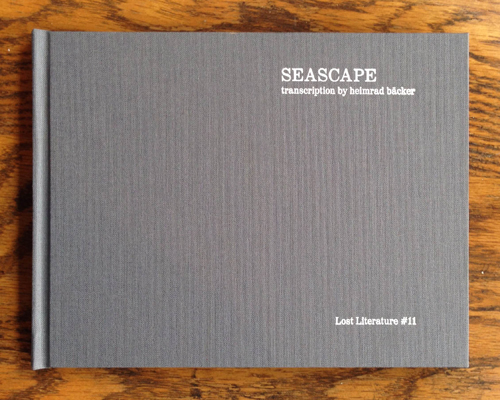Quad AL 0175, SW 4/5,
heavy rain, moderate
seas, poor
visibility.

Seascape – Special Edition
Heimrad Bäcker
Translated by
Patrick Greaney
Charles Bernstein, Contributor
June 2014
What is the poetry of Auschwitz?
Vanessa Place
Heimrad Bäcker’s Seascape uses documentary material to recount a minor historical episode from World War II: the crew of a German submarine comes upon three men on a Norwegian lifeboat and refuses to take them on board. Bäcker’s account of Nazi inhumanity uncannily echoes Un coup de dés, Marcel Broodthaers’ A Voyage on the North Sea, and other nautical texts of the avant-garde.
UDP Lost Lit #11.
About the Author
Heimrad Bäcker (1925-2003) was an artist, poet, and influential editor of the Austrian avant-garde. He is the author of seven volumes of poetry, includingtranscript (Dalkey Archive Press, 2010). He published major works by Austrian artists and experimental writers in his journal neue texte (1968-1991) and under the imprint of Edition Neue Texte (1976-1992), the publishing house that he ran along with his wife Margret Bäcker. Most of his literary works draw on the methods of concrete and visual poetry to present documentary material about the Shoah. These books were historical and literary, and they were also part of a critical autobiography, an examination of Bäcker’s enthusiastic participation in the Hitler Youth and the Nazi Party. Seascape was Bäcker’s first book; it was published in German in 1985, when he was 60.
Bäcker’s essay on documentary poetics appears in Jacket2.
An essay on Bäcker’s later work appears on crosspollenblog.
Praise
...skipping... onors the lives of those lost in World War II. The book is a manifestation of the lonely, vast, cold, bleak world with humanity cast as a mere blip on the radar. In fact, this is not a book that is read so much as it is held and examined.
Rebecca Hart Olander
Bernstein writes that Bäcker’s nachschrift “feels for the ground of a post-Englightenment, aftermodern poetry, as a blind person feels for another’s face.” He’s right, and Seascape succeeds not just as aftermodern poem, but as an emotionally compelling work of literature.
Harriet Staff
There is a poetic sort of comfort in the press of the letterpress in this book-object, in the creamy heft of the pages, in the way the work flirts...
Vanessa Place
About the Translator
Patrick Greaney is Professor of German Studies at the University of Colorado Boulder. He is the co-editor and translator of An Austrian Avant-Garde (Les Figues Press) and the author of Untimely Beggar: Poverty and Power from Baudelaire to Benjamin and Quotational Practices: Repeating the Future in Contemporary Art (both from University of Minnesota Press).
About the Contributor
Charles Bernstein is author of Recalculating (University of Chicago Press), Attack of the Difficult Poems: Essays and Inventions (Chicago), and All the Whiskey in Heaven: Selected Poems (Farrar, Straus and Giroux). He teaches at the University of Pennsylvania. More info at epc.buffalo.edu.
Publication Details
Special Edition
Cloth-bound. 20 pp, 7.75 x 5.75 in
Publication Date: June 12 2014
Distribution: Direct Only
Series: Lost Literature